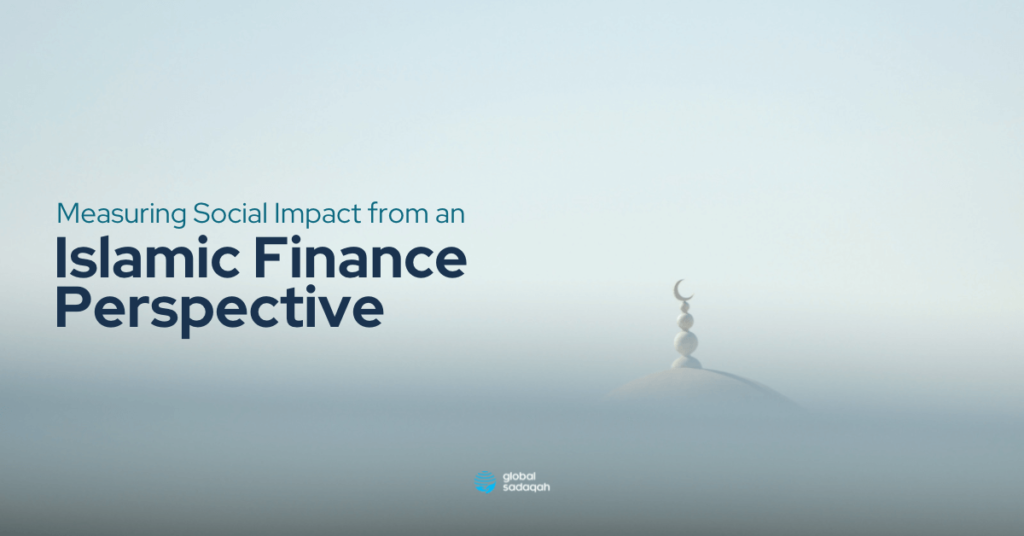Islamic finance has grown steadily in recent years and has the potential to play a key role not just for Muslims but also for non-Muslim countries.
Advances in Islamic finance and social finance show that there is a growing global interest in finding new ways to finance and create value in society, as both have comparable ethical tenets.
Shariah, which governs all Islamic financial instruments and investments, and its screening process, which is comparable to the negative screening methodology used by socially responsible investments, outlaws immoral firms and behaviours, tying the two together.
With that, social components in Islamic finance must include measurable objectives with key performance methods that justifiably qualify the social impact of such initiatives.
Here are a few practising concepts that are applied to measure social impact and coincide with the Islamic finance perspective.
Related – The Impact of Sadaqah On Society
Measures based on alleviating poverty

The Islamic economy has seen tremendous growth, but it has also opened up new markets and investments that can benefit society, such as infrastructure, education, healthcare, manufacturing, and production. A notable instance of Islamic finance principles being applied is in the aspect of alleviating poverty.
According to a Gallup study performed in the MENA area, 70 million people in the world live on less than $2 per day, with 20 million of the poorest parts living on less than $1.25 per day. According to the poll’s findings, 95% of adults in the MENA region consider themselves religious.
The above-mentioned findings have sparked greater interest in Islamic finance as a vehicle for promoting development that helps to alleviate poverty and prepare the path for the proper sort of growth.
Those who follow the Islamic economy are now wondering what the first step will be in launching a path that will have a long-term societal impact.
There are numerous Islamic finance structures that provide a strong foundation for the launch of innovative financial products; nevertheless, these structures must be translated into practical development financing solutions.
Instruments for financial inclusion

Financial inclusion is an important aspect of Islamic microfinance institutions’ (IMFI) mission to offer low-income and underprivileged people with access to Islamic financial products and services.
By supporting microfinance, MSE financing, and microinsurance, Islamic microfinance provides a more complete framework for financial inclusion, poverty eradication, and a healthy economy.
The Islamic notion of financial inclusion is built on two basic pillars: redistributive and risk-sharing instruments.
Both instruments are vehicles for putting Islamic ideas of social justice, inclusivity, and resource sharing into action. Finally, these instruments can be used in tandem to help the poor manage their spending, accumulate assets, raise their income, and start a business.
The instruments of zakat, sadaqah, waqf, and khums can be utilised as redistributive pillars for those who are below the poverty line (severe poverty), whereas the risk-sharing pillar is through collective support.
Second, for individuals who are above the poverty line, redistributive pillars such as Qard al-hasan, zakah, and waqf can be used, while risk-sharing pillars such as microfinance and microtakaful exist. Finally, low-income individuals can use hybrid solutions, with the risk-sharing pillar provided through MSMEs finance.
Circular economy and its relevance to Islamic Finance

Crises and calamities, whether man-made or natural, provide an opportunity for mankind to profit and learn lessons about being aware of Allah’s bounties and taking care of its rights.
One of the lessons learned is that capitalism is driven by profit maximisation acts that have negative consequences for our environment.
This economic hegemony has resulted in environmental issues, posing a threat to humanity’s survival. In this light, the circular economic movement arises as a means of overcoming adversity, preserving others’ rights, and safeguarding the environment.
The ideas of circular economy are undeniably compatible with Islamic economic thought.
We take materials from the Earth, manufacture products from them, and then toss them away as waste in our current system – the process is linear. In a circular economy, on the other hand, we prevent waste from being created in the first place.
The circular economy is built on three design principles: reduce waste and pollution, circulate products and materials (at their best value), and regenerate the environment.
A move to renewable energy and materials underpins it. Economic activity is decoupled from the consumption of finite resources in a circular economy. It’s a dependable system that benefits businesses, people, and the environment.
The circular economy concept espouses a zero-waste economic system that calls for moderation in consumption and better treatment of natural resources, which mirrors Islamic finance and economy principles.
Abiding by the Islamic moral economy

Islamic banking and financial institutions as we know them today arose as ‘commercial banks’ in the mid-1970s to meet the religiously built financial demands of individual Muslims.
They are regarded as value-oriented financial institutions that are guided by Islamic beliefs, morals, and ethical standards. While legal judgements in the form of Shariah injunctions dictate the operational nature of IBFIs in the form of compliance, the precepts of an Islamic Moral Economy determine the normative nature of their activities (IME).
As a result, IBFIs are expected to meet the IME normative requirements established by maqasid al-Shariah, or “Shariah aims,” which are described as “enhancing human and social well-being.”
As IME emerged to construct a human-centred economic development paradigm, the emergence of IBFIs was expected to motivate the socio-economic development of Muslim countries as institutions of IME by serving the financial needs of Muslim people in accordance with Islamic legal or Shari’ah principles.
Contributing to social impact initiatives

The UNEP FI’s Positive Impact Initiative (PII) recently released a paper that advocates for a reconsideration of the term “impact.” The report’s analysis is motivated by the fear that today’s ‘impact’ is seen as separate from financial institutions’ business practises.
Today, effect is frequently considered only after ensuring long-term financial gains. According to the PII, this is insufficient since it focuses too narrowly on the Sustainable Development Goals and creates a coordination challenge in securing acceptable financing sources for the necessary expenditures.
While there is still much work to be done in Islamic finance to provide outcomes that are more directly related to the SDGs, there are some adjustments that can help drive more immediate action in the direction of good effect.
The Islamic finance industry can assist the positive impact economy laid forth by PII while also more fully addressing the Maqasid al-Shariah if it takes a more integrated approach to financial intermediation to avoid social harm and produce social gain.
As seen in many of these ongoing developments, Islamic Finance is closely associated with the concepts of social progression like poverty alleviation, fostering financial inclusion and abiding by moral economy guidelines. Moving forward, it’s clear that Islamic Finance can help to tackle new challenges and problems in the various areas related to social impact.

